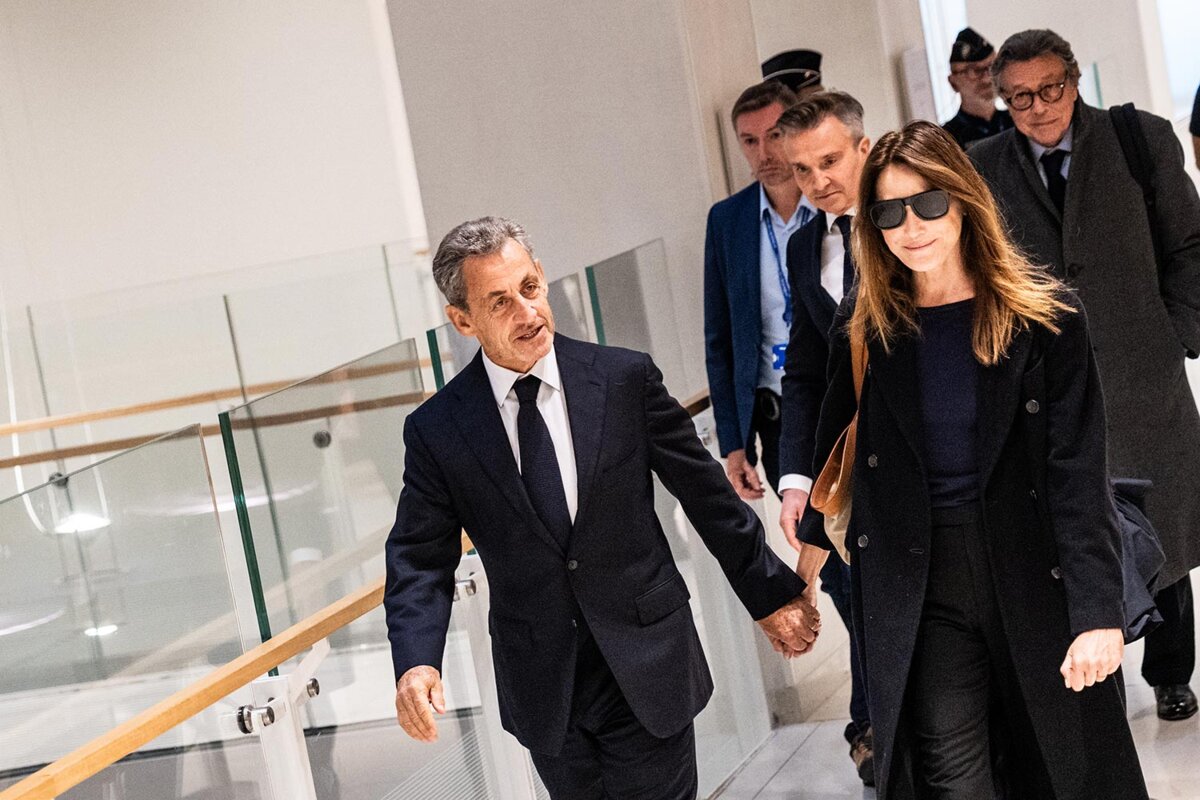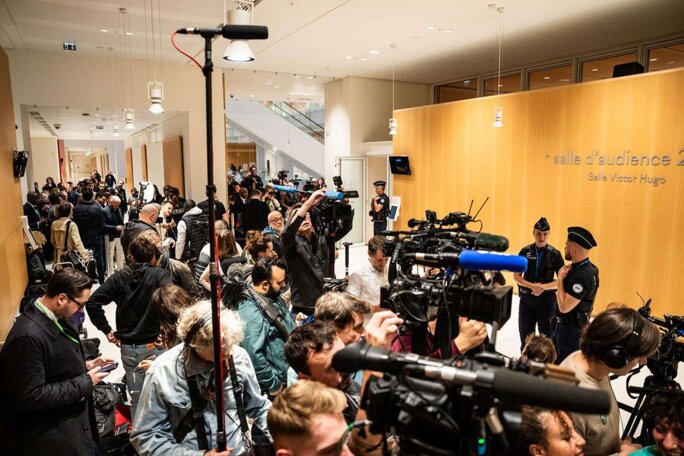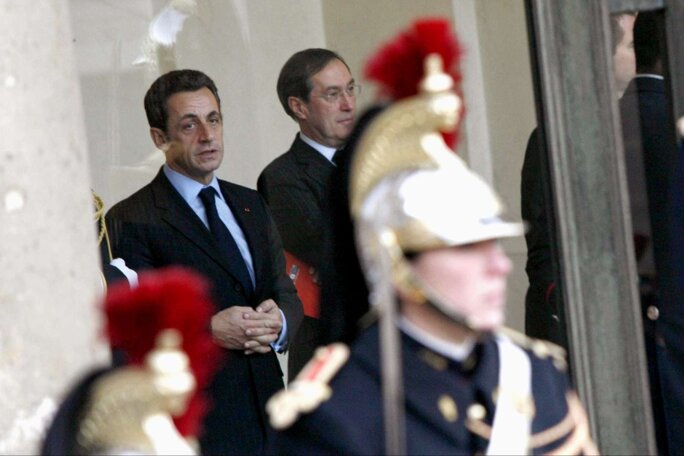Former French president Nicolas Sarkozy will serve time behind bars after being found guilty of criminal conspiracy over a plan to accept money from Muammar Gaddafi's Libyan regime to fund his 2007 election campaign.
The 70-year-old ex-head of state was jailed for five years, fined 100,000 euros and banned from public office for five years.
The court in Paris deferred the serving of the prison sentence to start at a later date, but said that Nicolas Sarkozy would begin his jail term before any appeal he might lodge. The financial crimes prosecution unit, the Parquet National Financier (PNF), has now reportedly summonsed the former president to appear before it on October 13th to fix a date for the start of his sentence.
Sarkozy was acquitted over charges of corruption, the receipt of the proceeds of the misappropriation of public funds, and illegal campaign financing.
In an historic verdict at the end of the most far-reaching political corruption trial ever held in France, judges also found Sarkozy's former presidential chief of staff, Claude Guéant, guilty of criminal conspiracy, passive corruption, passive influence peddling, forgery and use of forgeries, and aggravated money laundering. He was given a six-year prison sentence and fined 250 000 euros. Sarkozy's former minister and close aide Brice Hortefeux was convicted of criminal conspiracy but acquitted of illegal campaign financing, and was handed a two-year jail term, fined 50,000 euros and banned from public office for five years.

Enlargement : Illustration 1

The former president, who turned 70 in January, had been charged with corruption, criminal conspiracy, receipt of the proceeds of the misappropriation of public funds, and illegal campaign financing.
At the end of the three-month trial prosecutors had called for the former head of state to be given a seven-year jail term and a 300,000-euro fine for his role in the affair.
Passing sentence, presiding judge Nathalie Gavarino described Nicolas Sarkozy as the organiser of the criminal conspiracy, whose aim “was to organise corruption at the highest possible level for someone elected.” She spoke of “acts of the utmost seriousness”.
After the hearing a visibly angry Nicolas Sarkozy, standing next to his wife Carla Bruni, attacked the court's verdict, claiming it was a grim day for the “rule of law” in the country. “France's image has been humiliated. I am innocent,” he declared.
He added: “This injustice is a scandal. Millions of euros have been spent to find Libyan financing which the court has explained it hasn't found. If they really want me to to sleep in prison I'll sleep in prison, but with my head held high.”
At the heart of the case was the claim that Nicolas Sarkozy's inner circle took cash from Libya - sums totalling six million euros have been mentioned in documents - to fund the politician's 2007 presidential election campaign. In return, Sarkozy's team would offer diplomatic, economic and legal assistance to help restore Libya's international image, a country that had become a pariah state under Gaddafi's rule.
Prosecutors from France's financial crimes prosecution unit the Parquet National Financier (PNF) said that the Libyan funding affair had painted “a very dark picture of part of the Republic”. They claimed: “A picture marked by high-level corruption, stoked by ambition, lust for power and greed, which spun its web all the way up to the highest spheres of the state.”
Nicolas Sarkozy himself had denied taking any Libyan money and said the accusations were simply an attempt at revenge on the part of the Gaddafi clan after the bloody fall of Muammar Gaddafi's regime in 2011.
In its verdict the court concluded that there had been secret negotiations with the Libyan regime over the funding. But the judges also said there was no definitive evidence that money from Libya did ultimately make its way into Sarkozy's successful 2007 election campaign.
The case has lasted for many years. Mediapart's first investigations relating to the scandal were published in July 2011 and a judge-led criminal investigation, which lasted ten years, was launched in April 2013 (see our dossier here).
During the case, prosecutors claimed there had been an “inconceivable, extraordinary, indecent pact of corruption” with Muammar Gaddafi and his regime. It was a “Faustian corruption pact” with “one of the most disreputable dictators of the past 30 years”, they said, and that it began in 2005.
On October 1st of that year Sarkozy's right-hand man Claude Guéant had held a secret meeting in Tripoli with top Libyan official Abdullah al-Senussi, Gaddafi’s brother-in-law and head of the dictator’s military intelligence services.
In 1999, Senussi, who was regarded as the second-highest ranking official in the Libyan regime, had been sentenced in absentia by a Paris court to life imprisonment after he was convicted of being the mastermind behind the 1989 bombing of a DC-10 passenger plane operated by French airline UTA in which 170 passengers and crew died in a mid-air explosion over Niger in West Africa. After his conviction France issued an international warrant for Senussi’s arrest.
That October 2005 dinner with Senussi was the first time that the subject of Libyan funding for Sarkozy’s election campaign was raised, and prosecutors saw this as the starting point of the corruption pact. Guéant later claimed this meeting had been a “trap”. But in its judgement on September 25th the court said: “There was no trap. It's impossible that he would not have informed Nicolas Sarkozy on his return if he had been trapped.” The judges described the meeting as “undertaken knowingly” and whose “only possible aim was to raise a subject discreetly”.
Just five days after that meeting between Guéant, Senussi and the recently-deceased middleman Ziad Takieddine, the then French interior minister Nicolas Sarkozy, travelled to Tripoli to meet with Gaddafi. The following month, on November 26th, Sarkozy’s close friend and lawyer, Thierry Herzog, visited the country to discuss his proposed plan to overturn the international warrant issued for Senussi’s arrest.
The month after that, on December 21st, Brice Hortefeux, another close friend of Sarkozy and then a junior minister in his department, in turn visited Tripoli where he secretly met with Senussi, again in the presence of Takieddine. Hortefeux later claimed that he, too, had been trapped into this meeting, a version of events the judges said in their verdict was “not credible”.
The court ruled that Claude Guéant and Brice Hortefeux concealed the circumstances and purpose of their meetings with the state terrorist Abdullah Senussi, and must have spoken about these encounters to Nicolas Sarkozy. “No other alternative emerges,” the judges said.

Enlargement : Illustration 2

In the weeks that followed that December meeting between Hortefeux and Senussi, the Gaddafi regime sent an initial bank transfer of close to 500,000 euros into the account of Takieddine’s offshore company, Rossfield Limited. Part of that money was subsequently transferred to an account in the Bahamas belonging to Thierry Gaubert, a longstanding ally and friend of Sarkozy.
The court has also heard how before the 2007 election campaign began, Takieddine withdrew a total of 1.2 million euros in cash from a bank account in Switzerland into which Libyan money had been placed. Some of the cash withdrawals, notably of 200,000 euros, 275,000 euros and 300,000 euros, had aroused the bank’s suspicions because of their unusual nature.
The prosecution said that the withdrawals had no connection with Takieddine’s personal lifestyle, which was funded by other accounts he held.
Another key aspect in the case was an an extract of handwritten notes belonging to Shukri Ghanem, who was Libyan prime minister from 2003 to 2006 and subsequently oil minister from 2006 to 2011 before defecting when the Gaddafi regime was overthrown in 2011.
Ghanem handwrote notes of events on an almost daily basis from 2006 to 2012. The notes produced in court were dated April 29th 2007, and concerned the transfer of Libyan funds destined for Sarkozy’s election campaign. These were described as transfers of 3 million euros, ordered by Saif al-Islam Muammar al-Gaddafi, Gaddafi’s second son, and 2 million euros, ordered by Abdullah al-Senussi. In its verdict the court said these handwritten notes were genuine.
Not only did these sums correspond precisely with transfers made into the bank account of Takieddine’s offshore company Rossfield Limited, but the date of when the notes were written – in April 2007 – prove that the allegations of Libyan funding of Sarkozy’s campaign could not simply have been invented during the 2011 war by members of the Gaddafi regime seeking revenge in the French president, as Sarkozy's defence team has claimed.
The court in its judgement described the “Takieddine account” as working like a “secret clearing house.”
In relation to the conspiracy charges in the case, presiding judge Nathalie Gavarino listed the facts underpinning the finding of guilt: the central role of Ziad Takieddine, the meetings of Claude Guéant and Brice Hortefeux with the terrorist Abdallah Senussi, Shukri Ghanem's notebooks, the payments actually made by Libya into an account held by Ziad Takieddine “with the aim of financing the campaign,” as well as the political, economic and legal favours granted by France to Libya.
Claude Guéant and Brice Hortefeux “took particular care” to exonerate Nicolas Sarkozy, the judge noted.
The court thus confirmed that an “offer of funding” from the Gaddafi regime had existed.
In summary, the court found that under the authority of and on behalf of Nicolas Sarkozy, who cannot have been unaware of it, his two closest associates, Claude Guéant and Brice Hortefeux, had been negotiating as early as 2005 with the Libyans over a possible campaign financing deal. In return, Sarkozy’s team undertook to look into the criminal case against Senussi and to help restore Libya's international status back into the fold of nations.
When sentencing Hortefeux judge Nathalie Gavarino told him: “You agreed to meet Abdullah Senoussi, who had been convicted of terrorism.... Your role was decisive, but your part in the offence was limited.”
However, the court ruled out any link between the 440,000 euros received from the Libyans by Thierry Gaubert in his Bahamas bank account and the criminal conspiracy.
During the investigation, Claude Guéant denied using a vast strongroom he had rented from a bank during the 2007 election campaign for hiding cash. Guéant said it was instead used to store documents, and in particular old transcripts of Sarkozy’s speeches. “Of course […], retrospectively it was stupid,” commented Sarkozy of the rental of the strongroom.
And while the court said that Ziad Takieddine had made “large cash withdrawals” during the timeline of the election campaign, it noted that there was no proof these funds had actually gone into the campaign accounts.
As for the cash that was found in the campaign, the court said it gave “no credence” to the arguments put forward by former campaign treasurer Éric Woerth that anonymous donations had been sent by supporters through the post. But there was no conclusive proof that these funds were linked to Ziad Takieddine and the Gaddafi regime, it said.
Another key chapter in the affair was the curious way in which the French authorities sought to safeguard Bashir Saleh, Gaddafi’s former chief of staff and keeper of the regime’s secrets, on two separate occasions. The first was in November 2011, after the fall of the regime, when Saleh was arrested and held by Libyan forces opposed to Gaddafi (and who Sarkozy had, however, supported).
The second time was in May 2012, when Saleh, who had been living in Paris, was exfiltrated out of the country just days after Mediapart’s revelation on April 28th that year of a Libyan document authorising the Libyan funding of Sarkozy’s campaign. It was also just days before the second round of presidential elections, on May 6th, which would see Sarkozy lose his re-election bid.
Sarkozy had vigorously denied the charges against him, telling the court that he had not received “one centime of illegal money, Libyan or any other”.
A feature of the former president's defence was the way he sought to distance himself from his former closest of allies and their actions, particularly his former ministers Brice Hortefeux and Claude Guéant.
At one point Sarkozy told investigating judges of them: “I had no way of knowing the reality of their lives - if indeed one can ever truly know the life of anyone.” Then, sharpening his words like a guillotine blade, he noted: “This is even truer for those closest to us, those we love, who can sometimes disappoint us.”
“Incomprehensible,” “they were wrong,” “mistake,” “lack of judgement,” “error”: Nicolas Sarkozy did not mince his words when describing to the judges the close relationship between Claude Guéant and Brice Hortefeux and middleman Ziad Takieddine. And he was equally critical of the secret meetings they held with the intermediary in 2005 in Tripoli together with Abdallah Senussi, brother-in-law of Colonel Muammar Gaddafi, head of Libya's military intelligence and a convicted state terrorist.
In the end, however, jettisoning his closest allies in this way did not save him from being convicted of criminal conspiracy.
Nicolas Sarkozy has already been convicted in two other cases involving dishonesty, the so-called Bismuth phone-tapping affair and the Bygmalion election funding affair which concerned his unsuccessful 2012 election campaign. This third and even more serious conviction threatens to leave his reputation in tatters.

Enlargement : Illustration 3

As for Claude Guéant, who became chief of staff to President Sarkozy, he was also accused of personal enrichment in the affair, receiving hundreds of thousands of euros in Libyan money which he used to buy a flat in central Paris. The money was passed via another middleman, Alexandre Djouhri, who was found guilty of aggravated money laundering of the proceeds of tax fraud and active corruption in relation to that money. Djouhri, who was involved in the exfiltration of Bashir Saleh from France, was also found guilty of influence peddling and criminal conspiracy. The court sentenced him to six years imprisonment and a fine of three million euros.
Sentencing Guéant, presiding judge Nathalie Gavarino told the former chief of staff to the president: “You sought funding abroad. You accepted a substantial sum. And you compromised yourself with Alexandre Djouhri. You were untruthful in court.”
The banker Wahib Nacer, a close associate of Alexandre Djouhri, was convicted of complicity in influence peddling linked to Claude Guéant, for aggravated money laundering the proceeds from tax fraud and laundering the proceeds of active corruption, but acquitted of several other financial offences. He was given a four-year jail sentence and fined two million euros.
Bashir Saleh, who was tried in absentia and who is the subject of an arrest warrant, was found guilty of passive corruption in connection with a villa - Villa Mougins – near Cannes in southern France which was owned by a Libyan state entity, but acquitted of other offences. Saleh was given a five-year jail term and ordered to pay a fine of four million euros.
In all there were 12 defendants in the trial. Three men, former minister Éric Woerth former Airbus executive Edouard Ullmo, and Saudi businessman Ahmed Salem Bugshan, were all acquitted of the charges against them.
One of the accused, middleman Ziad Takieddine died just two days before the verdict was given. Another of the accused, Saudi businessman Khalid Bugshan, was given a three-year prison term and fined four million euros.
-------------------------------------
English version and additional reporting by Michael Streeter


